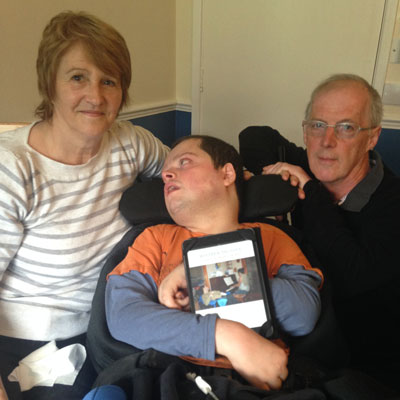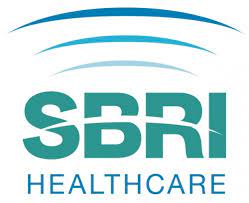Background
The background to My Health Guide goes back to Matthew Prosser and his family

Matthew was an adult with profound learning and physical disabilities living in Hull. Sadly Matthew passed away in November 2019. Throughout his life Matthew was exceptionally well-supported by his family (his parents and siblings). Matthew’s impact goes far beyond those he met, since he is the starting point for the My Health Guide project. His legacy continues to help many vulnerable people. He will be missed and remembered by many. What follows is the story of supporting Matthew, and how he helped inspire the creation of My Health Guide.
Meeting Matthew’s complex needs was challenging, especially when those needs are cared-for across a range of NHS and care-providing services.
Information was not always in the right location at the right time, and changing staff needed to be brought up-to-speed with Matthew’s changing treatment regime. Matthew’s situation is not unique and many hours are wasted repeating information about decisions previously made. When changes or decisions slip through the cracks, Matthew’s quality of life suffered and it took time, effort and energy to restore his equilibrium.
Ken Pugh, an independent specialist in adult social care, with more than 35 years experience in the field, was commissioned by Trish Bailey at Humber NHS Trust to produce Matthew’s Book. This is an iBook that provides a definitive, comprehensive account of Matthew’s life. Matthew’s parents, Tony and Tricia, planned the project together with Ken who collated the material, edited the content, and produced the finished iBook.
Together with key professionals, they prepared a multi-media, interactive, iPad-based guide to Matthew and his care needs. The professionals involved were very helpful and willing to be involved. They were happy to give audio interviews about Matthew’s needs. The physiotherapist did a video demonstration about positioning Matthew. Everyone involved provided material for the book and helped to proof-read it. They understood that capturing the instructions clearly in Matthew’s book meant that they would save time in the future; having to relay the same information to different individuals fewer times.
The book followed Matthew wherever he went, including hospital, to ensure that all staff working with him can quickly find out about the essential aspects of his care, and what good practice meant for him. Just as importantly the book helped staff to get to know and to relate to Matthew, creating a better prospect of a positive and engaged relationship.
Over 40 hours went into the creation of Matthew’s book, the time needed for video and audio editing in particular was significant. The book was created on a Mac computer, then loaded onto Matthew’s iPad using iBooks Author. As things stand iBooks Author can only run on a Mac. You also need the iBooks app on your iPad. The other software used was Mac’s Garageband to edit the audio interviews and iMovie to edit the videos. The book can be exported as a PDF file for others to access, but it’s large (over 1GB in size) and not easily distributed and you lose the interactivity of the iBook. You can read Matthew’s case study in full.
Once completed, Tony, Tricia and Ken spoke to many people in the learning disability community about Matthew’s Book, and there was overwhelming enthusiasm that everyone should have something like this. The issue, then was to overcome the financial, time, technological and practical obstacles in order to make this a reality for all learning-disabled adults.
SBRI Phase 1

In 2009 the NHS launched the Small Business Research Initiatives scheme (SBRI) to find solutions for identified healthcare problems. The scheme is devolved regionally to bring together business, health, technology and government partners to deliver a series of competitions for businesses to address major unmet health needs.
In 2014, Health Enterprise East (HEE), who run the SBRI scheme for the East of England launched a new phase 1 competition for technological innovations to support adults with learning disabilities. Having worked together before, Maldaba and Ken Pugh submitted an application to produce an innovation to solve the problems encountered with Matthew’s Book, and to make the benefits of Matthew’s Book available to everyone. It wasn’t called My Health Guide then – we didn’t have a name for the project!

Our application to produce and test a proof-of-concept was successful and ran until Spring 2015. During that time we created My Health Guide with Humber Trust in a co-production model: with both healthcare professionals and learning-disabled adults. Every aspect of the project was tested with both professionals and service users: the name; branding; fonts and colours; language; functionality; features. The co-production model was invaluable. As technologists it’s easy to get carried-away with the ingenuity of our innovation. The danger is that we lose sight of the target and create something which is not fit-for-purpose. feedback from service users and professionals quickly set us straight on the one of two occasions that occurred.
With My Health Guide, we’ve helped people use their own voice, rather then us telling them what we think is important. They’re more willing to work with us and to accept support.
Joanne Bone, Senior Nurse, Humber NHS Foundation Trust
The result of the phase 1 project was My Health Guide: an app that worked on both Google Android devices and Apple iOS devices, and secured user data using cloud back-up technology. The app was tested in both in-patient and day service settings, with users who had a range of mild to moderate learning disabilities. The pilot test results in phase 1 were overwhelming. Nobody wanted to stop using the app, and the impact it had on one user with anxiety and depression was so profound that when she went for her regular consultation with her Psychiatrist after 6 weeks using My Health Guide, he observed such a dramatic improvement in her self-management of her condition that he discharged her from his care.
SBRI Phase 2
Following the success of phase 1, Maldaba, Ken and Humber returned to SBRI for another competitive funding application. Phase 2 funding is designed to take successful phase 1 projects and scale them up for enterprise use, getting them into the real world and embedded in the NHS. This is a 12-month project that completes in Autumn 2016. New features have been added to the My Health Guide app following user feedback in phase 1. The cloud back-up service has been extended to a full platform-agnostic synchronisation and sharing service that lets app users grant others the ability to see and contribute to the content in the app remotely, via a web browser.
My Health Guide is underwent a 6-month trial with 200 service users at Humber NHS Trust and its care partners (later extended to a 12-month trial), and the project was independently audited and researched by researchers from the Centre for Applied Research and Evaluation at the University of Hull.
The aim for My Health Guide during this period was to assess its impact on a larger scale than the handful of users in the phase 1 pilot, and to make My health Guide available to the rest of the NHS and learning-disabled population across the UK.


